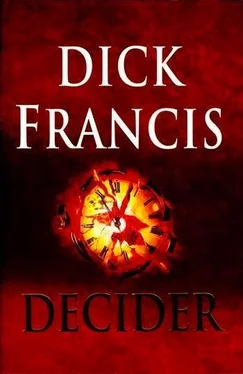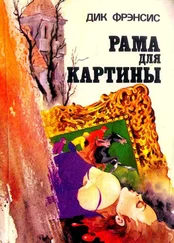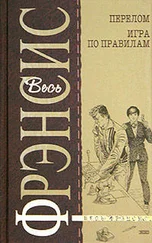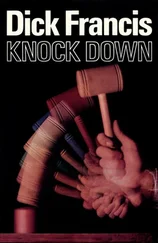Henry and I stood on the ex-circus stands and watched the race together. The whole field jumped the restored open ditch without faltering. Rebecca finished well back, not taking part in the finish.
Henry said racing didn’t grab him like rugger and went away to patrol his defences.
The afternoon passed. ‘There were the usual disasters,’ Roger said, dashing about.
I came across the racecourse doctor taking a breather between casualties. ‘Come to see me on Thursday,’ he suggested. ‘I’ll take all those clips out. Save you waiting around in the hospital.’
‘Great.’
Oliver, in the office, dealt with enquiries and wrathful trainers and arranged for a Stewards’ enquiry into an objection to the winner to take place in the inner office among the computers, copier and coffee machine.
On the whole, the pros whose business was everyone else’s pleasure made allowances for the stop-gap provisions, though it was interesting, as the day wore on, that they took the truly remarkable conjured-up arrangements more and more for granted and began to complain about the cramped weighing room and the inadequate view from the improvised stands.
‘You give them a man-made miracle,’ Roger complained, ‘and they want the divine.’
‘Human nature.’
‘Sod them.’
I spent some of the time with Perdita and Penelope, feeling disjointedly crazy, and some with my sons, thrust back into adulthood and paternity; but no more, thankfully, being told I was for the fairly immediate chop.
I did speak to Marjorie, who stood in for Victoria in the Cup-presenting ceremony, her neat upright little figure being protected through the throng by the solicitous bulks of Conrad and Ivan. Photographs flashed, a hand-held microphone produced fuzzy noises; the winning owners floated, the trainer looked relieved, the jockey prosaic (his tenth pair of cufflinks) and the horse, excited. A regular prizewinning; irregular day.
‘Lee,’ Marjorie said, beginning to make her way back to the big top but pausing when she saw me nearby. ‘A cup of tea?’
I went with her obediently, though the tea idea was quickly abandoned in favour of vintage Pol Roger from Stratton Hays’ cellars. Dismissing Conrad and Ivan, she took me alone into the tidied up dining room, where the trusting staff had righted the table and laid it freshly with crustless cucumber sandwiches and small coffee eclairs.
Marjorie sat on one of the chairs and came straight to the point.
‘How much is this all costing?’ she peremptorily enquired.
‘What is it worth?’
‘Sit down, sit down.’ She waited while I sat. ‘It is worth, as you well know, almost anything your huge friend asks. We have been flooded with compliments all afternoon. People love this tent. The future of the racecourse, no less, has been saved. We may not make a cash profit on the day, but we have banked priceless goodwill.’
I smiled at her business metaphor.
‘I have told Conrad,’ she said collectedly, ‘not to quibble about the bills. Oliver Wells is so busy, I’m giving you this message for him instead. I’ve called for a family meeting on Wednesday, the day after tomorrow. Can you and Oliver and the Colonel draw up a list of costs and expenses for me before then?’
‘Probably.’
‘Do it,’ she said, but more with persuasion than bossiness. ‘I’ve told Conrad to instruct our accountants to present an up-to-date realistic audit of the racecourse as soon as possible and not to wait for the end of its financial year. We need a survey of our present position, and it’s imperative we sort out what we intend to do next.’ The clear voice paused briefly. ‘You have shown us today that we should not rebuild the old stand as it was before. You have shown us that people respond to a fresh and unusual environment. We must build some light-hearted stands.’
I listened in awe. Eighty-four, was she? Eighty-five? A delicate-looking tough-minded old lady with a touch of tycoon.
‘Will you come to the meeting?’ she asked, far from sure.
‘I expect so.’
‘Will Mrs Faulds?’
I looked at her dryly. ‘She said you recognised her.’
‘Yes. What did she say to you?’
‘Not a great deal. She said chiefly that if the racecourse can be run prosperously, she won’t press for the land to be sold.’
‘Good.’ Marjorie’s interior relief surfaced in a subtle loosening of several facial muscles that I hadn’t realised were tight.
‘I don’t think she’ll want to come to the meeting,’ I added. ‘She had read about the family disputes in the newspapers. She just wanted to know how things stood.’
‘The newspapers!’ Marjorie shook her head in disgust. ‘I don’t know how they heard of our arguments. Those reports were disgraceful. We cannot afford any more discord. What’s more, we cannot afford Keith. ’
‘Perhaps,’ I said tentatively, ‘you should just let him... sink.’
‘Oh, no,’ she said at once. ‘The family name...’
The dilemma remained, age old; unresolvable, from their point of view.
At the end of the day the crowds straggled off, leaving litter in tons. The big top emptied. The caterers packed their tables and chairs and departed. The afternoon sun waned in deep yellow on the horizon, and Henry, Oliver, Roger and I sat on upturned plastic crates in the deserted expanse of the members’ bar, drinking beer from cans and holding anti-climactic post-mortems.
The five boys roamed around scavenging, Toby having joined them belatedly. The Strattons had left. Outside, horseboxes were loading the last winner and losers. The urgency was over, and the striving, and the glories. The incredible weekend was folding its wings.
‘And for our next act...’ I declaimed like a ringmaster, waving an arm.
‘We go home to bed,’ Roger said.
He drove me and the boys good-naturedly down to the bus, but in fact he himself returned to the buildings and the tents to oversee the clearing up, the locking, and the security arrangements for the night.
The boys ate supper and squabbled over a video. I read Carteret’s diaries, yawning. We all phoned Amanda.
Carteret wrote:
Lee persuaded me to go to an evening lecture on the effects of bombing on buildings. (The I.R.A. work, more than air-strikes.) Boring, really. Lee said sorry for wasting my time. He’s got a thing about tumbledown buildings. I tell him it won’t get him bonus points here. He says there’s life after college...
‘Dad,’ Neil said, interrupting.
‘Yes?’
‘I asked Henry the riddle.’
‘What riddle?’
‘Do you know a rabbit from a raceway?’
I gazed in awe at my super-retentive small son. ‘What did he say?’
‘He said who wanted to know. I said you did, and he just laughed. He said if anyone knew the answer, you did.’
I said, smiling, ‘It’s like the Mad Hatter’s riddle in Alice in Wonderland : “What’s the difference between a raven and a writing desk?” There’s no answer at all.’
‘That’s a silly riddle.’
‘I agree. I always thought so.’
Neil, whose taste for Pinocchio had won the video fight (for perhaps the tenth time) returned his attention to the nose that grew longer with lying. Keith’s nose, I reckoned, would in chat line of fantasy make Cyrano de Bergerac a non-starter.
Carteret’s diary:
The ‘great’ Wilson Yarrow was there, asking questions to show off his own brilliance. Why the staff think he’s so marvellous is a mystery. He sucks up to them all the time. Lee will get himself chucked out for heresy if the staff hear his comments on Gropius. Better stop writing this and get on with my essay on political space.
Pages and pages followed in a mixture of social events and progress on our courses: no more about Yarrow. I fast-forwarded in time to the partially ripped note-book and read onwards from the exclamation marks about the Epsilon prize. There seemed, for all my searching, to be only one further comment, though it was damning enough in its way.
Читать дальше




